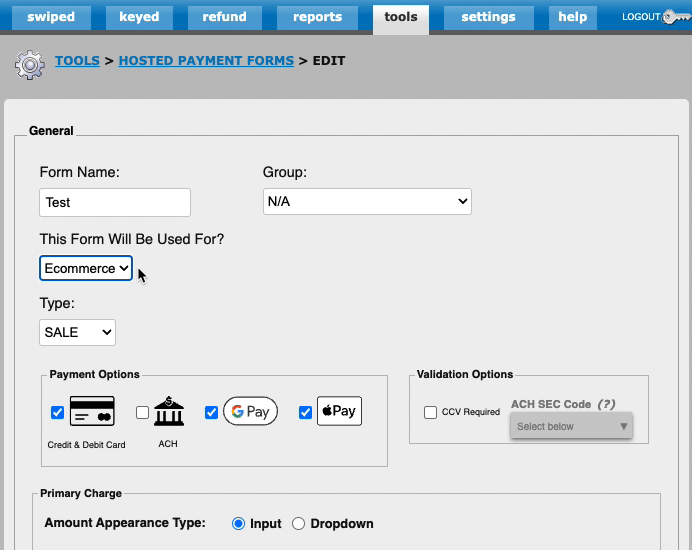PayConex - 2.3.2022
Highlights from this release include the addition of Google Pay and Apple Pay to the Hosted Payment Form as well as NACHA Verification for reissuing transactions.
New Features and Enhancements
Hosted Payment Form enhancements
Apple Pay and Google Pay on Bluefin’s Hosted Payment Forms
eCommerce Merchants can now add Apple Pay and Google Pay™ to their Hosted Payment Forms. This feature increases conversion and provides consumers with a secure, fast checkout experience.
Improved payment selection experience
We have added a dropdown field on the Hosted Payment Form general setting to identify how this hosted page is used so merchants can see the payment selection available for their use case.

Enhancement for Cancel URL Redirect
The Hosted Payment Form cancel URL will now include parameters and values in the redirect. This means less chance of losing things like session data for some of our merchants.
PayConex Product Notifications
In an effort to improve our communication with our users we improved our Product notifications. In the near future, you will be able to receive product news and release notifications directly within PayConex.
PayConex Favicon
We have updated PayConex favicon and product name so that they are in line with the Bluefin brand guidelines.
Added ability to settle batch using group parameter
For agents processing transactions with a processor that allows manual batch settlements, the group parameter can now be used in conjunction with the SETTLEBATCH command.
NACHA Verification for Reissue Transactions
We have added an enhancement to our Real-time ACH Verification offering that allows a merchant setting to force or bypass verification for reissue transactions. This is useful for merchants who manage their own recurring transactions.
Reporting Service API Timestamp Filtering
We have added the ability to filter reports by UTC timestamp so that reports can be retrieved containing desired transactions regardless of timezone settings within sub-accounts.
Requirement for POSTBack URL Changes
To adhere to security best practices POSTBack URLs will now be required to be valid HTTPS end-points.
